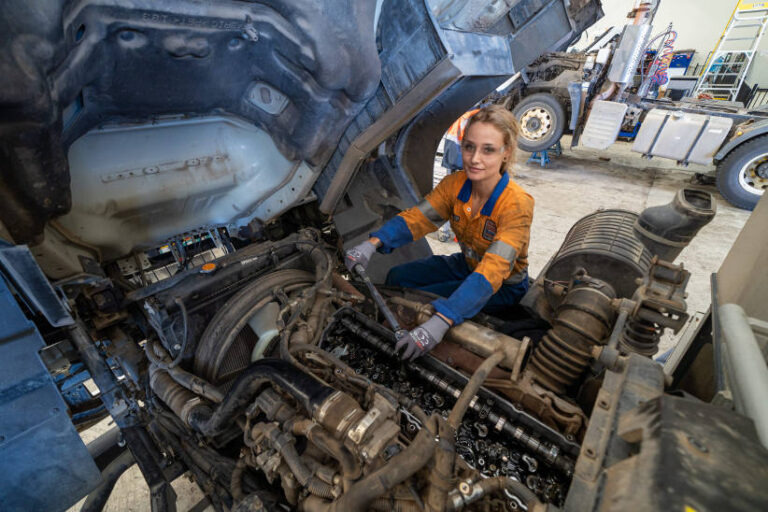This article was originally published by Isuzu Trucks.
Skills shortages have been a major concern for Australian industry for decades. In the transport sector, the government has noted persistent skills shortages in mechanics going back as far as 1994, with a recent report showing almost half of approximately 70,000 automotive businesses surveyed were experiencing skills shortages.
As 2021 rolls into gear, we speak with a new generation of technicians who are tackling the challenge head on. They’re smart, keen, and are breaking down barriers as they chase their dreams in the automotive industry.
We spoke first with Tallia Herbertson, an apprentice technician working at Gilbert & Roach Newcastle.
It was an innate interest in trucks that led Tallia to shelve her nursing studies and walk through the doors of Gilbert & Roach Newcastle as an apprentice service technician. Now in her final year of apprenticeship, Tallia reflects on her experiences as a young woman working with trucks and discusses her plans for a future career as a master technician.
How did you start your career working with trucks?
I’ve always liked trucks and I’ve always been curious about how they work. I don’t have a family background or any real backstory to support my interest, but it’s there.
I finished high school and started a nursing degree, but I didn’t enjoy the pharmaceutical side of nursing. I thought that fixing people and fixing trucks could be similar, so I made the jump over to be a truck technician.
Interesting comparison! Did you start your apprenticeship at Gilbert & Roach straight away?
Not straight away. I completed my pre-apprenticeship through a recruitment company and then worked in servicing for a fleet company for a year and a half before I moved to Gilbert & Roach in 2019. I’ve been here since then.
What were the differences between working in a truck dealership versus a fleet company?
Working at the fleet company was more about fixing trucks quickly and getting them going again. That’s still true at the dealership, but the services are more substantial and require more brainpower.
My experience has been all uphill since moving over. I’ve learned so much and had so many opportunities, especially in diagnostics and engine work.
Were you able to diagnose problems when you arrived at Gilbert & Roach, or did you have to upskill?
Yeah, definitely upskill. Servicing mainly happens in your second and third year of apprenticeship, and then you get trusted on the bigger jobs—diagnosing trucks and everything that comes with that happens in your final year.
At first it was a bit intimidating being trusted to diagnose a customer’s truck, but once the ball got rolling, it’s all good! You just need to remember to trust the process and take things step-by-step.
The end of your apprenticeship is coming up, what are your plans for the future?
I hope to be kept on with Gilbert & Roach and work towards becoming a master technician in the future.
It’s going to take a lot of training. Online training, diagnostics and just being around as many trucks as possible. I’ll have to be at Gilbert & Roach for a few years to get there.
What has your experience been like as a young woman working in what has traditionally been a male-dominated industry?
At first, it was pretty hard to fit in. Management were supportive, but most of the guys in the workshop were thrown off by a woman working with them.
I’m not sure if they were intimidated by me, or the other way around, but after about six months they got used to it and it became easier.
What advantages are there to being a female technician?
I can fit under the cab of an Isuzu truck! I also find I have more patience for finicky jobs.
What changes have you noticed in the industry over the course of your apprenticeship?
I think it really depends on where you work. Before Gilbert & Roach, my workplace didn’t seem really on board with the idea of a young woman working as a technician. There were suggestions that I would never be able to do the job properly, that I would never be able to move truck tyres, or I wouldn’t be able to lift the bonnet of a cab… that I should work on cars instead of trucks.
Gilbert & Roach is different—we’ve just hired another female apprentice technician, and everyone is a lot more open to the idea of having women working in this area.
I have seen more women at TAFE, as well as more women enter the workplace. I think the blokes are becoming more open to the idea of a woman being able to do a “man’s job”!
In terms of truck technology, what changes have you noticed under the bonnet?
Technology is advancing quickly. It’s less mechanical now, there’s definitely more electrical work involved. The training is changing with that, as well as the way we diagnose issues.
I’m considering doing an auto-electrical apprenticeship after I finish this one, to be on top of things as the industry changes. It would also help me work towards becoming a master technician.
What are three pieces of advice you would give to other young people, particularly young women, looking at a career in the workshop?
- Be persistent
- Believe in yourself
- Don’t be scared to ask for help






